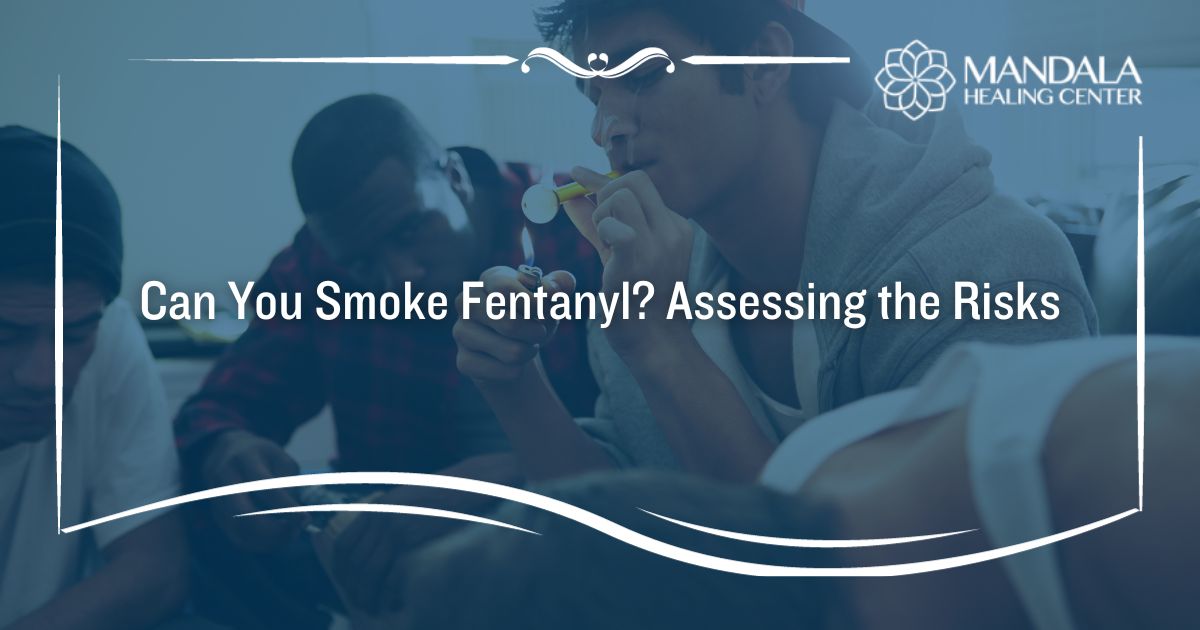The United States is in the midst of a fentanyl crisis, with tens of thousands dying of unintentional exposure and overdose each year. Fentanyl is a powerful and dangerous drug that can only be used safely under careful medical supervision–yet many people use it recreationally with deadly consequences.
Recreational fentanyl users ingest the drug in several ways. They may inject it, snort it, or take it orally, But can you smoke fentanyl? This article will explore the risks of smoking fentanyl, how to recognize fentanyl use and overdose, and how to find the treatment you need to stop using this hazardous opioid.
Reach out to the specialists at the Mandala Healing Center now to learn more about the dangers of smoking fentanyl or to learn about our supportive substance use disorder treatment programs. Our holistic approach to addiction treatment and support will empower you on your recovery journey.
What is Fentanyl?
Fentanyl is a potent prescription opioid painkiller. Doctors may prescribe fentanyl for patients recovering from surgery or medical procedures or for those who have developed a tolerance to other opioid medications.
Fentanyl works in a way similar to morphine and other prescription opioid pain relievers, but it is much stronger. Fentanyl can be as much as 100 times stronger than morphine. The risk of fentanyl overdose is so high because tiny amounts can be deadly.
Like other opioids, fentanyl works by binding to opioid receptors in the brain in areas related to pain control and pleasure. People who take fentanyl often have significant reductions in their perception of pain. Users may also experience a sense of calm or euphoria.
People who take fentanyl for long periods may become addicted to it and turn to illicitly-produced fentanyl.
In a medical setting, prescription fentanyl is most commonly available in a patch that administers the drug through the skin. Illicit fentanyl is available in a powder. Recreational users typically inject or snort the powder.
Some users may smoke fentanyl. People who smoke fentanyl typically combine it with heroin or methamphetamines.
The Dangers of Smoking Fentanyl
Public health and medical specialists often classify fentanyl among the most dangerous drugs in the United States. It is potent and deadly in very small doses.
The dangers of fentanyl are significantly increased when people smoke it compared to some other ways of using it. There are several reasons behind this jump in risk.
- First, people who smoke fentanyl typically combine it with heroin and other substances. Using fentanyl and other opioids, including heroin, can raise the risk of overdose or other complications because the effects of both opioids are increased. People who smoke fentanyl and heroin together may experience dangerously depressed breathing that can result in a lack of oxygen to the brain, coma, and death.
- Second, smoking fentanyl allows the drug to get into the bloodstream quicker, meaning the effects occur more rapidly than some other methods of ingestion. The effects can be more intense and longer-lasting, which can increase your risk for overdose and addiction.
- Finally, smoking fentanyl can lead to severe and irreversible lung damage. Opioids like fentanyl can cause significant respiratory depression, leading to a lack of blood in the lungs. In the short term, people who smoke fentanyl risk death from respiratory depression. In the long term, users may develop lung complications like pneumonia and tuberculosis. People who smoke fentanyl are also at risk of developing a severe and chronic cough and asthma, which can impair breathing for the rest of their lives.
While smoking fentanyl is extremely dangerous, the truth is that there is no safe way to use fentanyl outside of a medical setting. People who use fentanyl in any way–injecting, by mouth, snorting, or smoking–are at extreme risk for a deadly overdose.
If you or someone you love uses fentanyl or other opioids, seek treatment immediately to avoid the life-threatening consequences of fentanyl abuse.
Recognizing Fentanyl Abuse
The only way to reduce the risk of overdose and other severe, life-threatening complications is to seek treatment for fentanyl abuse and addiction. Recognizing fentanyl abuse is the first step toward treatment and recovery.
Here are some of the signs of fentanyl abuse:
- Using fentanyl recreationally (without a prescription)
- Taking more frequent or larger doses of fentanyl
- Wanting to stop taking fentanyl but finding you can’t stop
- Spending a lot of time, energy, and money getting fentanyl, using it, and recovering from using it
- Experiencing intense cravings or urges to use fentanyl
- Continuing to use fentanyl after experiencing significant mental, physical, emotional, or social harm
- Engaging in risky behavior while using fentanyl, such as driving under the influence or having unprotected sex
- Experiencing withdrawal symptoms if you do not take fentanyl
Fentanyl abuse can quickly become life-threatening. People who use other opioids, including heroin, are at risk of accidental fentanyl exposure and overdose. If you or someone you love exhibits signs of fentanyl abuse, you must seek treatment immediately to avoid severe harm and death.
Get Fentanyl Abuse Treatment Now
If you or someone you love abuses fentanyl, do not wait another day to get the treatment you need to stop. Reach out to the Mandala Healing Center specialists now to learn about our effective fentanyl addiction treatment programs or to find support at any stage of your addiction recovery.












